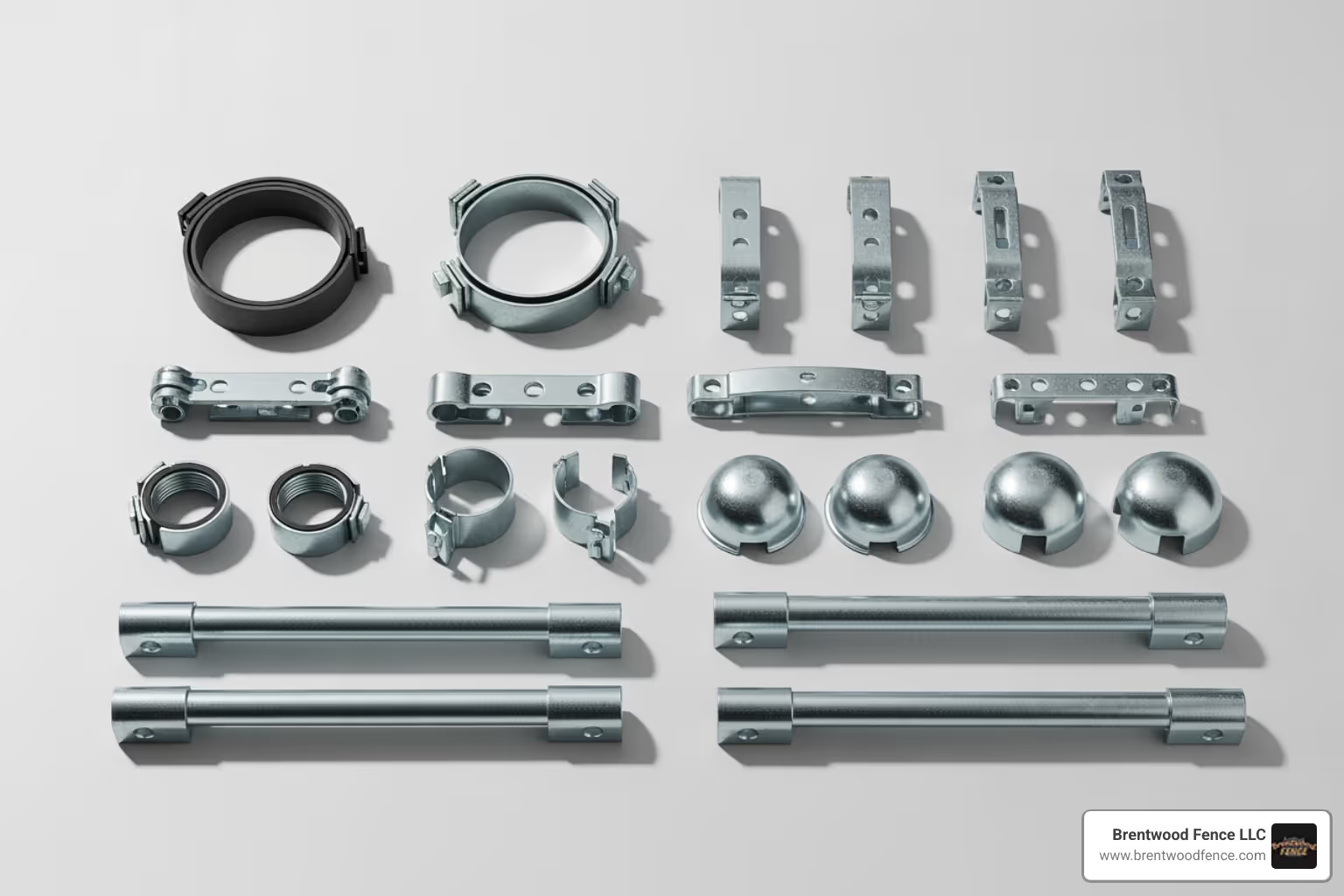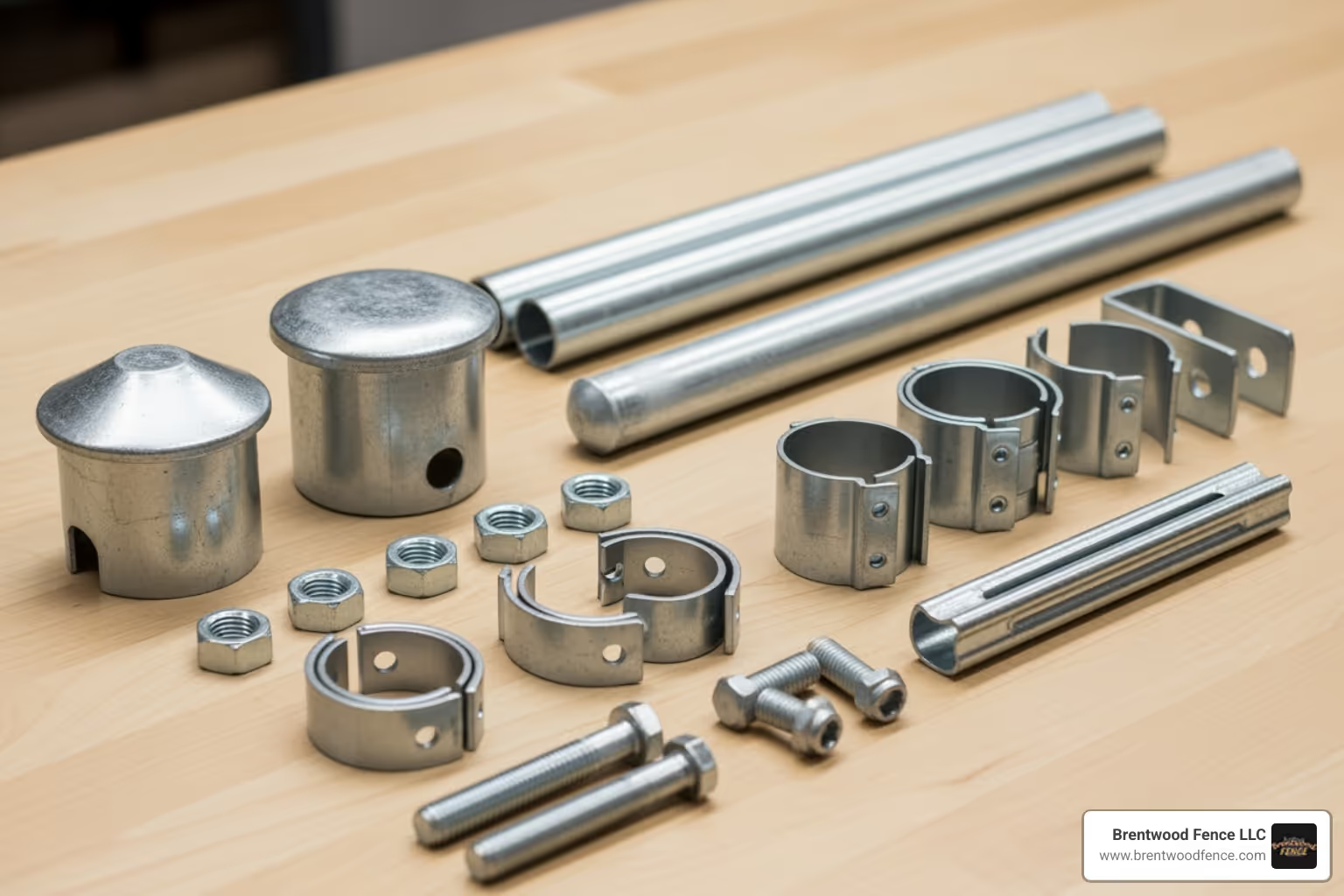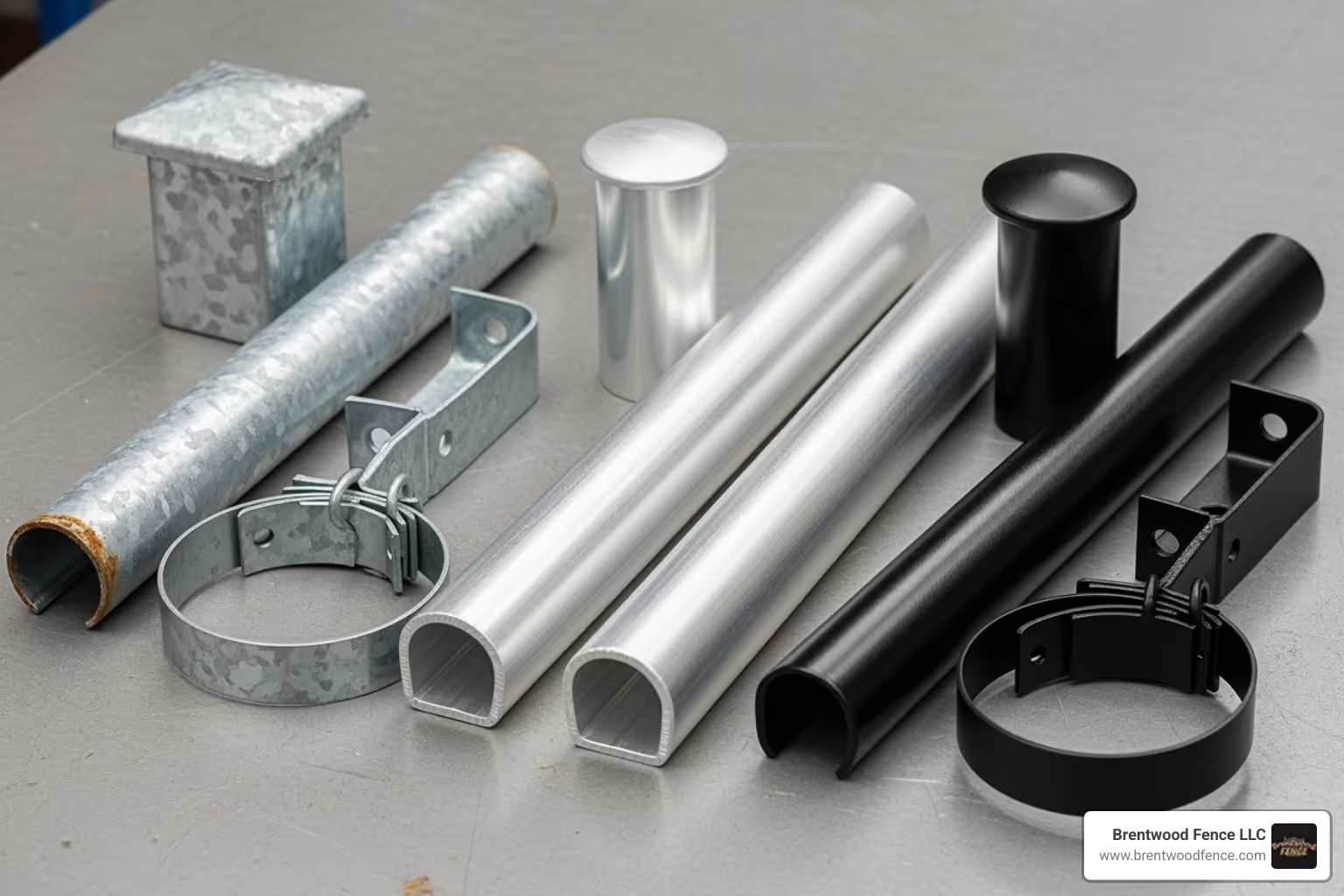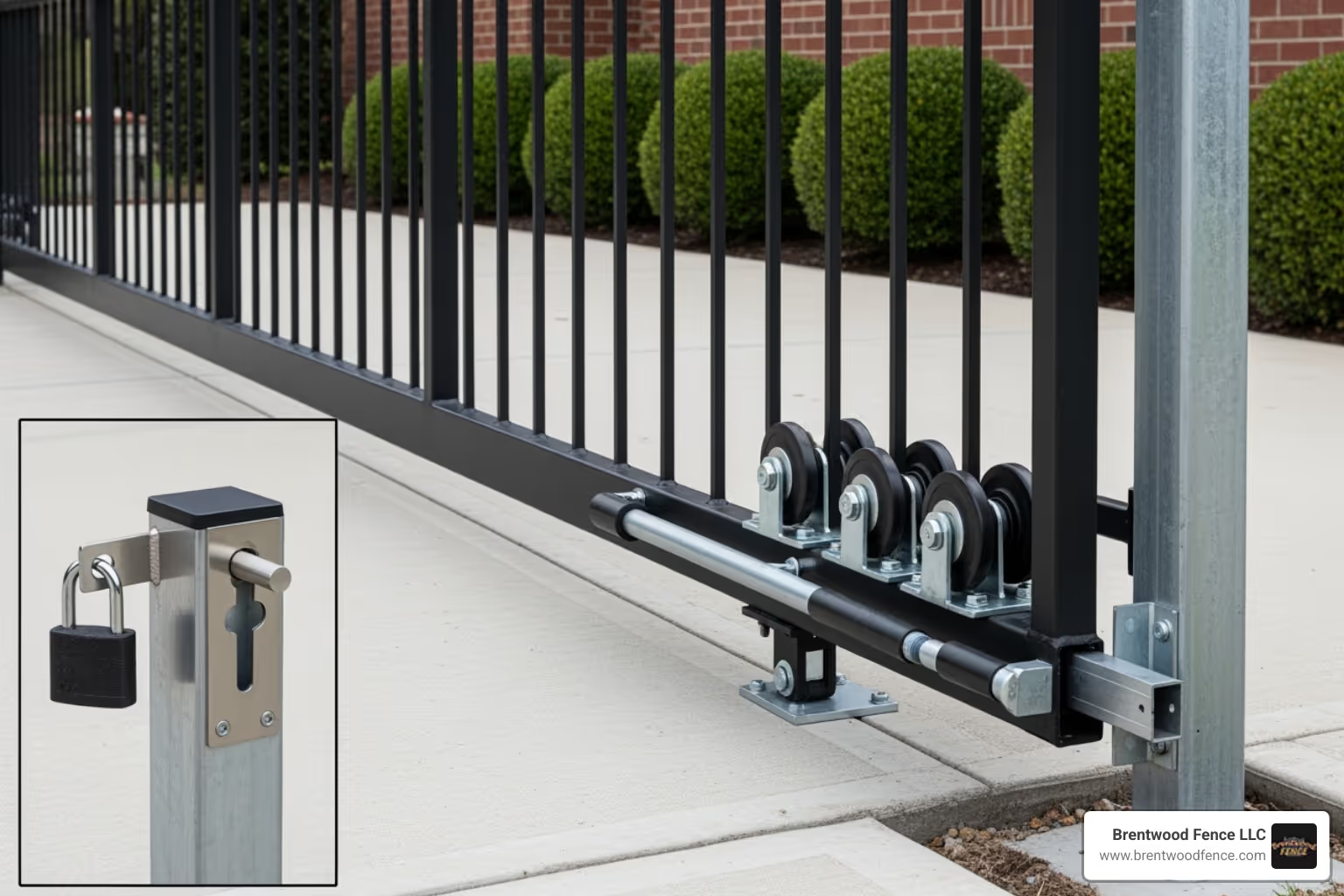Blog Content
18
Sep
2025

Chain link fence hardware is the critical backbone determining if your commercial fence stands for decades or fails within years. While the mesh fabric is most visible, it's the posts, rails, and fittings that bear the structural load and weather the elements.
Essential Chain Link Fence Hardware Components:
Commercial properties face heavy traffic, security requirements, and constant exposure to weather, demanding hardware built for decades of use. The difference between a 10-year and a 30-year fence often lies in choosing the right hardware materials upfront. Galvanized steel, aluminum, and powder-coated fittings each offer distinct advantages. Understanding these components is key to an investment that protects your property and maintains its professional appearance.

Easy chain link fence hardware glossary:
What makes the difference between a commercial fence that stands strong for twenty years and one that sags after a few seasons? The answer is the chain link fence hardware working behind the scenes.

This section breaks down the core hardware that forms the backbone of any commercial chain link system. Each component has a specific job, and when they work together properly, you get a fence that can handle daily use and harsh weather.
The framework is the foundation of your fence's security and durability.
Properly attaching and tensioning the chain link fabric is critical for creating a functional barrier.
The structural integrity of your fence depends on all these pieces working together. When properly installed, your fence will stay tight, look great, and provide real security.
The material of your chain link fence hardware dictates its lifespan, maintenance needs, and resistance to the elements. Making the right choice ensures your fence will stand strong for decades, while the wrong one can lead to rust and early replacement.

Galvanized steel is the workhorse of the fencing world and the industry standard for commercial applications. During galvanization, steel components are dipped in molten zinc, creating a protective coating that bonds to the steel. This zinc coating acts as a sacrificial layer, corroding before the steel underneath can rust.
Galvanized steel is ideal for commercial projects due to its durability and corrosion resistance. It provides incredible strength and is a cost-effective solution that offers a long lifespan with minimal maintenance, making it a smart long-term investment.
Aluminum fittings offer unique advantages, particularly in specific environments. Aluminum is lightweight compared to steel, which can ease installation, especially for large fences and gates.
More importantly, aluminum is completely rust-proof. It naturally resists corrosion, making it the best choice for coastal areas where salty air can quickly degrade other metals. Its longevity in these conditions often justifies a higher initial cost.
For projects where appearance is as important as function, powder-coated and vinyl-coated fittings provide both improved protection and aesthetic flexibility. Popular color options like black, green, and brown allow hardware to match coated chain link mesh, creating a cohesive, professional look.
The coating process adds a hard, durable finish that resists UV rays and scratches, providing improved protection over the base metal. For retail centers, office complexes, or any property where aesthetics are a priority, colored hardware can significantly improve the property's appearance.
Here's how these materials stack up:
The key is to match the material to your specific needs. Galvanized steel is great for high-traffic industrial sites, aluminum is perfect for coastal locations, and coated options provide performance plus a professional look.
This section covers the technical specifications and specialized parts for commercial, industrial, and high-security projects. In commercial fencing, precision is critical. Incorrect sizing can halt a project or lead to a fence that fails under pressure.
Chain link fence hardware components must fit together perfectly. One wrong size can cause significant delays.
Always measure twice and order once to avoid costly mistakes.
High-security sites, pools, and other facilities require hardware that goes beyond the standard setup.
Understanding and using the correct specialized hardware ensures your installation meets all safety and quality requirements. For detailed industry specifications on chain-link fence fittings, see the ASTM F626 Standard Specification for Fence Fittings.
Gates are the most frequently used part of any fence system, and for commercial properties, their hardware must be robust and reliable. A gate that sags, sticks, or fails to latch is a security liability and a daily frustration.

Swing gates are straightforward and reliable, but their longevity depends on the quality of the hardware.
For wide openings or tight spaces, sliding gates are an excellent solution. They rely on specialized hardware to function correctly.
The smooth, reliable operation of any gate system depends on quality components working together seamlessly.
For commercial chain link projects, having the right tools and a reliable supplier is essential for staying on schedule and within budget. Efficiency and consistency are key to a successful installation.
Properly installing chain link fence hardware requires specialized equipment to ensure a long-lasting, professional result.
Using professional-grade tools makes the installation process faster and more reliable.
For contractors and facility managers, a good supplier relationship is as important as quality tools. Securing materials at wholesale pricing is crucial for the economics of large-scale projects.
A reliable wholesale partner provides competitive pricing and ensures stock is available when needed, preventing costly delays.
Your commercial chain link fence is only as strong as its weakest component. Cutting corners on hardware to save a few dollars upfront often leads to expensive repairs, security breaches, and early replacement.
Choosing high-quality, application-appropriate chain link fence hardware is the most important decision for your fence's long-term success. The right hardware ensures your fence will stand strong for decades, whether it's securing an industrial facility, a commercial property, or a recreational area.
Every component, from galvanized steel posts to specialized gate hardware, works together as a system. Investing in quality, properly sized hardware is an investment in peace of mind. The material choice is equally critical: galvanized steel offers durability, aluminum provides rust-proof performance in coastal areas, and powder-coated options deliver both protection and a professional appearance.
With over four decades of industry experience, Brentwood Fence LLC understands that the best fence is one you can install and rely on for years. We provide a complete range of commercial-grade fittings designed for New England's demanding climate, built to last through harsh winters and humid summers.
For expert advice on choosing the right hardware for your project and for wholesale pricing that makes quality affordable, contact our specialists. We're here to help you build a fence that's truly built to last.
Copyright 2022 Brentwood Fence | All Rights Reserved | Sitemap | Website by Plumb Development a Digital Marketing Agency